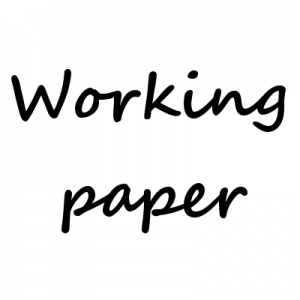Working papers
Publication Types:

Time Pressure and Focal Points in Coordination Games: Experimental Evidence
How does time pressure affect the power of focal points in coordination games? We experimentally examine the effects of varying time pressure in a coordination game with a label-salient focal equilibrium. We consider both a payoff symmetric (pure) coordination game and a payoff asymmetric battle of the sexes coordination game with conflict of interest. The data show that in the symmetric game the label-salient outcome is highly focal regardless of how much time subjects have to decide. In the asymmetric game, in contrast, higher time pressure makes it significantly more likely that coordination is on the label-salient outcome. Our findings suggest that the results from the existing literature on focal points in coordination games with conflict of interest, which did not control for explicit time constraints, may underestimate the power of focal points when decision makers are time-constrained.

Empowering consumers to reduce corporate tax avoidance: Theory and Experiments
We analyze corporate tax avoidance in a theoretical model and in a stylized experimental Bertrand setting in which symmetric firms and consumers sell and buy a homogeneous product, when human participants make decisions as firms and consumers. We investigate how market power and information disclosure of firms’ tax avoidance behavior impacts corporate tax avoidance and market competition. By imposing a tax rating, corporate tax behavior becomes more transparent, and consumers actively and costly boycott firms that do not pay their taxes. Firms adapt and anticipate consumer boycotts and increase tax payments, and prices. When rating disclosure is voluntary, the positive effect on corporate tax compliance vanishes in large markets.

Information defaults in repeated public good provision
We present an experiment that models a repeated public good provision setting where the policy maker or manager does not have perfect control over information flows. Rather, information seeking can be affected by changing the information default as well as the price of information. The default is one either with or without information about others’ contributions, and having information comes with a positive, zero or negative financial incentive. When information comes without a financial incentive or even is financially beneficial, almost all subjects choose to have the information, but around a third have the information even when this is costly. Moreover, a default of not having information about the others’ contributions leads to a slower unravelling of cooperation, independent of the financial incentives of having information. This slower unravelling is explained by the beliefs about others’ contributions in these treatments. A secondary informational default effect appears to take place. When the default is no information, subjects do not seek information more often but, conditional on financial incentives, they tend to believe that more other subjects seek information.

Framed payslips and people's reactions to labor tax changes
Payslips are supposed to notify employees about wage-related information, enabling them to adjust their labor supply, when appropriate. However, payslips are often information-laden and complex to understand, casting doubt on whether they are adequately up to the task, potentially resulting in inefficient labor supply reactions. In a real-effort laboratory experiment we use a variety of information frames to potentially support a better understanding of wage related information. We find that participants strongly react to changes of incidental wage costs, yet the framing of payslips has no additional effect on people’s labor supply. Nevertheless, including simple graphics increases comprehension and readability.

Focality is intuitive - Experimental evidence on the effects of time pressure in coordination games
We experimentally examine the effects of varying time pressure in a coordination game with a label salient focal equilibrium. We consider both a pure coordination game (payoff symmetry) and a battle of the sexes game with conflict of interest (payoff asymmetry). In symmetric games there are no effects of time pressure, since the label-salient outcome is highly focal regardless of how much time subjects have to decide. In asymmetric games less time results in greater focality of the the label-salient action, and it becomes significantly more likely that any coordination is on the focal outcome.
